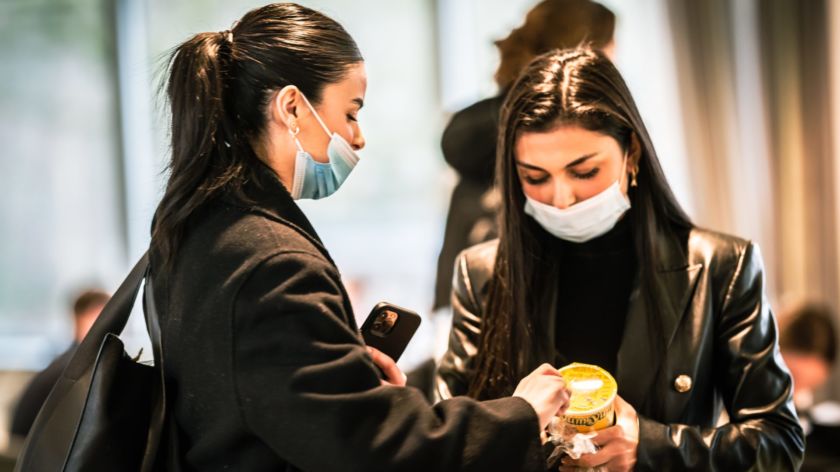‘The government violates human rights with their covid strategy’
-
 Photo: Johannes Fiebig
Photo: Johannes Fiebig
The government is failing in its strategy to combat covid. From now on, for example, vulnerable people have to protect themselves. A group of experts, including professor Vivienne Matthies-Boon, has therefore come up with an alternative plan. ‘Many people underestimate long covid.’
Vivienne Matthies-Boon has been at home for two and a half years. She is professor of Humanism, Europe and Global Justice at Radboud University and contracted long covid. Although she is now doing better – she can walk the dog again – there is little prospect of recovery. The disease course of long covid is a lot different from that of better-known diseases. Furthermore, additional research funding for long covid is not part of the government’s long-term strategy. The likelihood of new treatment methods is therefore decreasing.
Uncertainty
Long covid patients therefore live in uncertainty. Both socially and medically – they run a greater risk of experiencing another serious covid infection – and financially. After all, even employees with a permanent contract will not stay on forever. As we in the Netherlands are now ‘living life with the virus’, as the government’s strategy is, that automatically means that with every wave there will be an increase in long-term sickness.

Yet you don’t hear much from this group. ‘Quite logically’, says Matthies-Boon. ‘This group is simply not capable of protesting. They are too tired to speak out and run too many health risks to physically assemble on the Malieveld (large protesting area in The Hague, ed.).’ To give these people a voice, Matthies-Boon co-authored the report Uit Isolatie (out of isolation, ed.).
The report, and the accompanying petition, is a call to Minister of Public Health Ernst Kuipers, and all members of the House of Representatives, to invest more money in biomedical research into long covid, to spread better information about the condition, to create understanding, and to include vulnerable people in policies to keep society open.
In the report you state that there is little general awareness of long covid and its consequences. Where do you notice this?
‘I think a lot of people underestimate the disease. It’s not that you don’t feel well after a virus. It is a systemic disease. It gets into your organs. In my case, I was hospitalised twice, was blind in one eye for a while and had a covid tongue (painful, swollen tongue, ed.). An acquaintance of mine – despite being vaccinated – contracted long covid and as a result, a brain infection, which caused her to lose her speech and no longer being able to read. It’s very diverse and can happen to anyone.’
‘In the Netherlands, we are very much all-or-nothing’
‘I think that’s where a lot of the misconceptions originate: every covid infection is different. You can be fully vaccinated, or you can have gotten through your first infection fine. And then still get long covid the next time. A less pathogenic variant such as omicron makes little difference. Perhaps fewer people end up in hospital, but unfortunately it has little effect on the number of long covid patients.’
How do you think society should be organised then? Many people will not like the idea of continuously living with restrictions to prevent long covid.
‘The use of the word ‘restrictions’ is part of the problem. That is how we went through the entire pandemic in the Netherlands: from restriction to restriction. In Germany, it is approached in a completely different way. The focus is not on the rules, on what is and is not allowed, but on the concept of ‘protection’. For yourself, or for the other. I think that this vision can lead to much more understanding.’
‘In the Netherlands we are also very much all-or-nothing. We are either completely free of restrictions or completely locked down. I think I speak for everyone when I say that this does not make anyone happy. The Netherlands always reacts very late, and then suddenly has to hit the brakes. It would be better if, when the numbers are rising, a few smaller, less drastic protective measures were taken at an earlier stage. For example, FFP2 masks in indoor public areas. Then it’s much easier to keep everything open and you don’t have to keep locking society up.’
The government’s strategy appeals to society’s ‘common sense’ and states that ‘sectors themselves know what works best to continue welcoming people with vulnerable health.’ How do you view that?
‘As I said earlier, many people do not know what long covid means, and therefore how best to protect this group – and other groups of vulnerable people. It is also often not clear what the sectors themselves can do. What other measures can be taken besides keeping a distance or using facemasks? It is an incredibly unclear plan that falls on the shoulders of the individual.’
That was also Ernst Kuipers’ message, wasn’t it? That vulnerable people must protect themselves?
‘That is true, but with an infectious disease like covid that is not really possible. You are dependent on the environment. Moreover, there is no clear dividing line between who is vulnerable and who is not. Anyone can turn out to be susceptible to long covid, despite being in good health.’
‘You put the group of vulnerable people outside of society’
‘This strategy also violates the human rights of vulnerable people. The government has an obligation to protect people from serious illnesses. As minister Kuipers put it, it comes down to the fact that part of society will live with the virus, while others will be forced into isolation. This places the group of vulnerable people outside of society, which is ethically objectionable. The minister has a responsibility, so he can’t just tell all the sectors to sort it out themselves.’
You have sent the report to all members of parliament before they debate the long-term strategy on Thursday. What do you expect from the debate?
‘I hope that MPs will ask critical questions. And I hope that more attention will be given to the seriousness of long covid. In the Netherlands, people still act as if the disease is all in your head. Even minister Kuipers’ strategy emphasises ‘feeling vulnerable’ instead of ‘being vulnerable’. While it is not about an emotion, or a ‘feeling’. People with long covid are often in the prime of their lives. They don’t want to sit at home, they want to contribute to society, and they can’t because they are seriously ill.’



